New Makeup Test Policy
Between school trips, family vacations, doctors’ appointments, college visits, and inevitably getting sick once in a while, Ramaz students occasionally miss school. Ramaz administrators have long discussed how to deal with students who miss tests, and this year, they imposed significant changes. The longstanding makeup policy that let students personally negotiate the dates of makeup tests with their teachers has now been replaced with a more centralized policy that involves grade deans in the process. The new policy includes four key changes in addition to more minor language alterations.
First, the new policy limits students to three makeup tests per semester and only one in any subject, after which a student must meet with their advisor and Grade Dean and will not be allowed to take another makeup test.
Ms. Krupka explained that this won’t be simply a blanket policy, and there will be exceptions in extenuating circumstances. Missing tests for school trips won’t count toward the three-makeup limit. However, many students voiced concerns that they would be missing too many tests for school trips and would run out of makeups, so it seems that this exception wasn’t clear to the majority of the student body. “I’m scared that I won’t be able to take tests because I miss a lot of school for club trips,” said one student.
Additionally, in the case of medical issues, the school would speak with Nurse Nechama in order to assess each student’s individual situation. Ms. Krupka explained that in some cases, students absolutely need to miss school for doctors appointments and there are no other options, but in other cases, students can reschedule these appointments to avoid missing tests. This policy “opens a conversation, which is also good to learn in terms of adult life—instead of just coming late to work every day because I have an issue, how I manage that conversation with my supervisor is an important one to have, and I think a kid who is missing his or her third physics test of the semester should be asked to have that conversation and to develop the ability to have that conversation, even if it’s totally legitimate, and they’re going to end up being excused for it.”
Second, students may no longer delay taking their makeup tests indefinitely after returning from an absence; the new policy requires that students take makeup tests the day they return to school—taking precedence over extracurricular activities—or within a week, if a student was absent for a longer period of time and missed multiple tests.
Third, the new policy does away with the old rule that students who arrive late to school on test days aren’t allowed to sit for the exam; now, students may arrive late to school and take a test, but that test will count as one of their three makeups. This change came about because the old policy was almost never enforced; as Ms. Krupka explained, particularly if a test was in the morning, a teacher wouldn’t have much time to find out who came late before administering the test—she described it as “a logistical nightmare.” However, this meant that more students were coming in late on test days than other school days.
“Students felt it was a really unfair advantage to kids whose parents were okay with letting them sleep in for three hours because they stayed up till three—and if you had the kind of parents like I had growing up, who said you had to go to school every day unless you were sick enough that you couldn’t leave your bed, then it felt like an unfair advantage,” explained Ms. Krupka, “and also an unfair advantage to local kids” who are able to walk over to school whenever they’re ready for a test, unlike students who have to take the school bus and don’t have the same flexibility.
This new policy surrounding lateness is much more enforceable than the previous one; now, it’s up to the grade dean to coordinate latenesses with the test calendar, alerting students who came to school late on test days that they have now used one of their three makeup tests. Instead of having to assess these situations in a rush the morning of the test, the grade dean will have a few days to match the attendance system and test calendar without the same time pressure.
Fourth, all the students who missed a test are no longer required to take the makeup test together; some departments may still require this, but it is no longer a schoolwide policy.
Ms. Krupka explained that this change happened “bottom up,” with the new makeup policy initiated and created by a team of teachers in conjunction with the administration. For teachers, the abuse of the old system was difficult because it forced them to write multiple versions of tests for students who needed to take makeups and prevented them from returning tests for long periods of time while waiting for a few students to take makeups. Furthermore, “It’s an unfair advantage even if you get a separate test,” said Ms. Krupka, “because you’re getting a lot of information from kids what the test was, and it’s not educationally a good idea for kids to feel like, ‘oh, whenever I’m good, I can just take the test or I can just miss one.’ Teachers felt frustrated by it.”
Ms. Krupka framed this policy change as part of a larger change in the school’s attitude, working to “approach executive functioning and professional responsibility from a more structured way” and treating students more like adults, including setting higher expectations in and out of the classroom. She also explained that these changes—similar to the lateness policy—should only actually affect a small number of individuals, but the affect the old situation was having on the morale of the larger student body was disproportionate to this small subset of the population, making it a larger issue that had to be addressed. The majority of surveyed students, 43%, remembered taking 1-2 makeup tests last year; 15% remembered taking zero; 22% remembered taking 3-4; and 20.6% remembered taking more than five, including 9% who remembered taking more than 10, aligning with the subset to which Ms. Krupka referred.
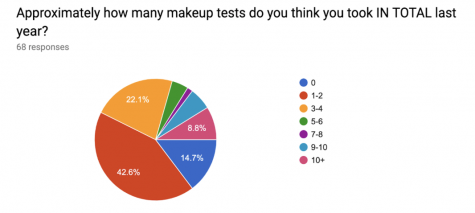
This policy will be publicized with parents as well so that parents take tests more seriously and think more carefully before allowing their students to miss school and face the threat of a potential zero if the student doesn’t follow the new rules.
Students had mixed reactions to these changes. Of the 68 sophomore, junior, and senior students surveyed, only 11.8% felt positively toward the new policy, 51.5% were neutral, and 36.8% regarded it as negative. Additionally, although grade deans were supposed to explain the new policy at orientation, only 22% of students indicated that they completely understood these changes. 11% didn’t know the policy had changed, and the majority, 66%, knew the policy had changed but didn’t know all the details.
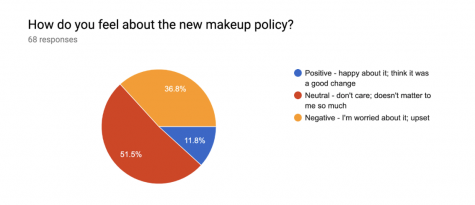
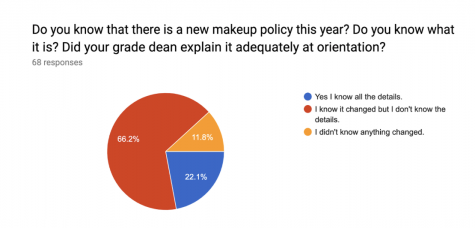
“The new makeup test policy worries me and will be negative in my life in many ways,” wrote one anonymous student, “I will be less committed to clubs because I won’t be able to miss a test, if I am sick I will be pressured to go to school even if I don’t feel well, and my whole family will have to switch around a trip because of me.” Another student worried that “if you are sick for a week you already are out of makeups and may not even be able to make up all the tests you missed with the new policy.” A third student believed that “The makeup policy needed to be changed, but it doesn’t seem like it’s going be enforced nor was it enforced at all last year, so I don’t think anything’s really going to change.”
Other students believe this new policy is necessary because “kids took advantage of the last policy. Even I had to take advantage of it once.” 22% of polled students indicated that they had taken a makeup test in the past year because they weren’t prepared to take the test on time and wanted extra time to study, and 13% of students stated that this was the primary reason they took makeup tests in the past year, so this issue does seem to be fairly widespread. 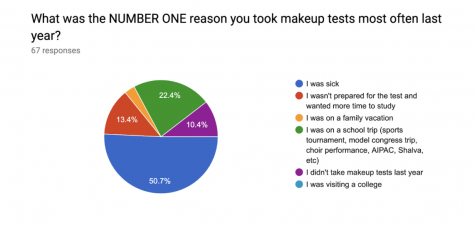
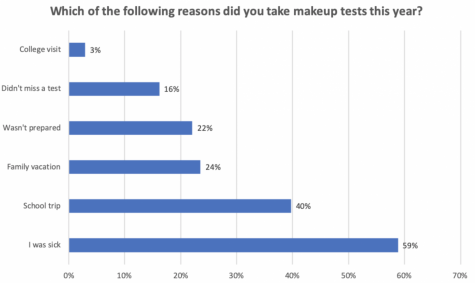
“I feel that people were unfairly coming late to school to study for a test which gave them an advantage over others taking that test the same day,” wrote another student. Looking ahead, hopefully this new policy will solve these problems of latenesses and absences on test days.
[table id=2 /]
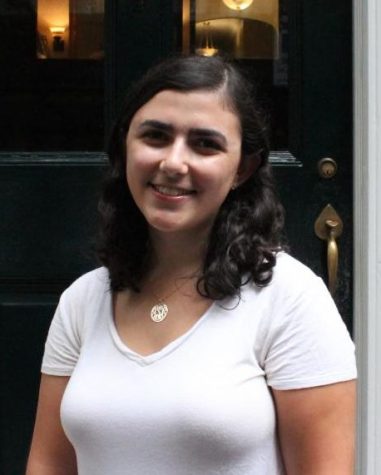
Josephine Schizer has been writing for the Rampage since her freshman year and is excited to be serving as Co-Editor-in-Chief. Outside of Rampage, Josephine...


